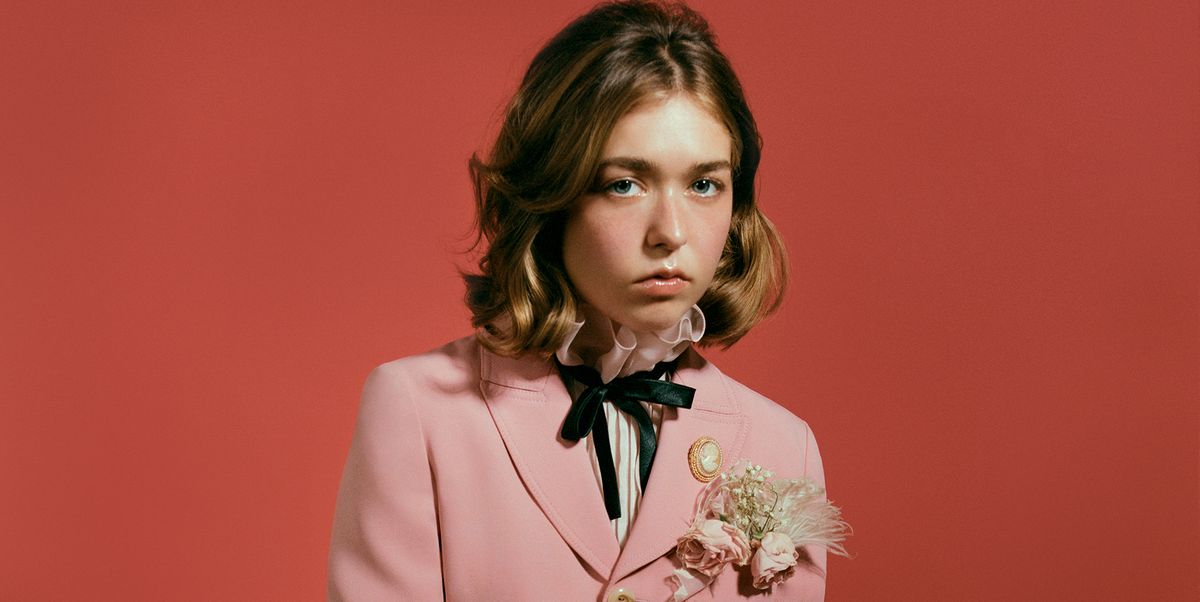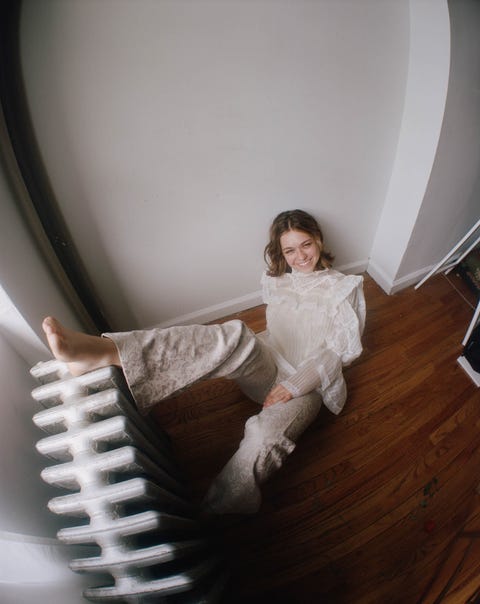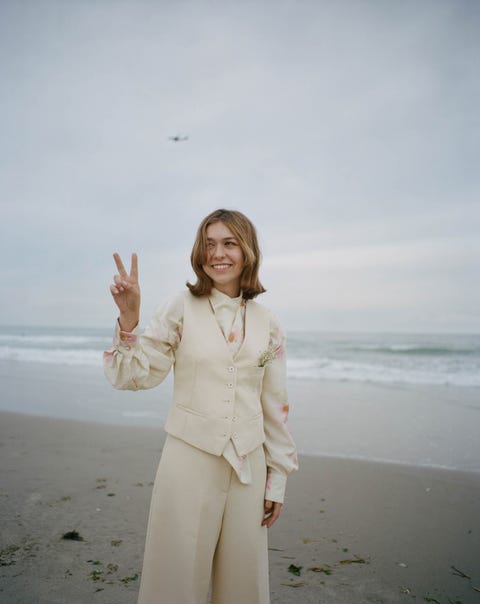After Lindsey Jordan released Lush—the debut album of her indie-rock solo project Snail Mail—in 2018, a part of her wasn’t sure that she’d be able to write songs again. But that changed at the start of the pandemic when she found herself in isolation. “I discovered that I had a lot of pain inside of me that I wanted to get out,” Jordan tells ELLE.com over Zoom from her East Village apartment, where she’s lived for the past three years.
The reality was that the breakout success of Lush—which Jordan wrote when she was just 17—and a three-year jaunt on tour left her “totally fried.” Now 22, she found herself reflecting on how coming of age as a young rock star affected her—and how it left her “misguided” about the world. “There was just no time for self-actualization,” she says. She doesn’t even recognize who she was before. “I can’t think of one thing about my personality that’s the same as it was, really.”
When the pandemic happened and tour ended, Jordan needed to press pause. “I was really not working on shit,” she recalls. She found solace in jigsaw puzzles, reading books, cooking, exercise—“anything but music.” At the same time, she endured a serious breakup. She also spent a month and a half in a rehab facility late last year.
Her sophomore album Valentine, a campy swirl of heartbreak, melodrama and pain, started to come together thereafter. But the process took time: She’d worked on it intermittently, sometimes even in between tour, and finally finished writing in February 2021. It was officially released last week.
Diving into a more expansive sonic palette, Jordan’s follow-up to Lush takes her to new emotional depths as she navigates the grief of a breakup and reframes its narrative with revenge fantasies. Stitched with swooning synth-pop melodies, nasty kiss-offs, and explosive anthems, the album shows Jordan using an excruciating breakup to rewrite her story and build herself back up again.
Below, Jordan speaks to ELLE.com about the making of Valentine, her love for Drake, and grappling with her fast-rise to indie-rock fame.
How did the success and fame from your breakout record affect you?
When I got out of that album cycle, I felt disconnected from the people around me. I had lived all of these other lives that my friends at home were not living. All the context that I had for everything was super obscure. All of a sudden I had all of these adult skills in this one area that had nothing to do with real life. I went all the way from extroverted to introverted by the time I started music and then came out the other side. It just changed me so much.
When lockdown happened last year, had you already written Valentine or been in the process of working on it?
No, I was kind of hesitant to work on a second body of work. I don’t know how to explain it other than a paranoia that doesn’t exist. But every time I write a song I’m always like, “This is gonna be the last one. I’ve taken from the bank enough, and now I don’t know how I’m gonna ever do this again.” So, I was like, I’ll take it one song at a time, and I’ll keep writing songs and seeing where it takes me because I was just scared shitless coming out of the security of knowing what I was gonna do all day long. I had a couple of songs that I had from in-between moments on tour where I would just work on something, and there were a few songs that I liked enough that I knew they were going on to the next thing, but I really didn’t have a place to put them. There was no idea of an album, no trajectory, I just was like, “I’m gonna tour and see what happens.” And then when the pandemic started, I was going through a lot of my own shit, and I discovered that I had a lot of pain inside of me that I wanted to get out. I was like, “What did I do last time with all this pain? Put it into an album.” I’m just gonna keep writing my pain songs and see if anything comes out of this in a diary entry-way again. And it totally did. It all sort of came from being isolated in the pandemic.
You went through your first really big breakup ahead of releasing this record. How did that unfold throughout the music?
There’s a few heartbreaks being referenced throughout the record. But I did experience real heartbreak for the first time in a way. Lush, a lot of it is dreaming about love, yearning, wanting more and having all these expectations for what it’s going to be. Valentine is the dark contrast to your childhood imagination of what love is and the process of really figuring out what it actually looks like when two humans are involved—rather than a human and a concept. Real, painful-ass, bag of bricks to the face heartbreak is definitely represented throughout the record.
Do you feel like making Valentine was a cathartic process for you?
It was definitely cathartic. I was writing it in real-time. That was how I was coping in the moment. There’s really something to the idea that writing helps you understand your own emotions. Then just really feeling those emotions while you’re working…I mean, I cried tears, a lot. I’m processing it actively.
How did this record make you feel more comfortable with yourself?
The actual process of writing a song connects me with my inner self in an almost spiritual way, where I feel the most in touch with a greater purpose. The process of trying to get a lot of these experiences down on paper in a way that I would be able to feel comfortable with following my last record was really life-altering. There’s a cool thing about having a job like getting to write songs and it’s that you can truly freak it in the lyrics, be true to yourself, get weird, and say cringey intimate shit, and it’s totally fine. That’s getting more in touch with myself than anything else I can imagine. And doing it publicly, it’s such a weird thing.
Was there ever a point in time that you thought you weren’t going to pursue music anymore after Lush?
Definitely. I think that now after making the second album. It almost feels like there isn’t really a working process for me. The magic only happens when I’m really inspired and anytime I’ve ever tried to force it, it doesn’t happen. So I’m always like, “What if the inspiration doesn’t come back?” I’m constantly thinking about the fact that your feelings dull as you get older. Mine are, at least. Things become less dreamlike and more discovered. It’s always such a toss-up, but every time I come up with something, I’m so happy.
What influenced the sonic palette of your new LP?
I was going through it during the pandemic. Drake has always been one of my favorite artists of all time, but I listened to my Take Care vinyl a lot. I was getting into a lot of jazz, which is interesting. I don’t necessarily know if it comes out of my writing. Lots of pop. It helped me a lot in isolation listening to stuff that was both terribly sad and upbeat. The sad stuff inspires me, the upbeat stuff keeps me from getting too deep in the feelings. Lots of Elliott Smith, too, always. I was reading a lot of Joan Didion, Ocean Vuong, George Saunders, and Raymond Carver.
Visuals were a huge part of the record as well. Why were they so integral to the music on the album?
When I look back on my experience with Lush, I was so overwhelmed in high school. I very much didn’t involve myself in any of the [visual] processes. On this record, there’s so much more intention, and I wanted to put some of that energy into the visuals. I was working with a stylist, still am, on all my looks, which were all pretty meticulously planned over several months. The initial stages of “Valentine” just came from my brain: “I want this big chocolate cake, decadent shit, I want blood, I want spurned love.” Then, I wrote a treatment and shopped it around to directors to see what they would come up with. Josh Coll, [the director] who we went with, was the most in touch with what I wanted. I worked really directly with “Valentine” on putting it together—and the same with “Ben Franklin.” Working so much on every single thing that went into making this album makes it feel much more personal to me. I’m just like, “Damn, this is really my child.”
What’s the story behind “Ben Franklin?”
“Ben Franklin” is my baby. That song is the only song I’ve ever written having it be instrumental first. The actual song ended up being this apathetic tone. I’m trying to get in touch with a side of myself that is totally put on as a coping mechanism. The music video is sick: There’s a big, 10-foot snake in it, also a puppy, and I did a bunch of choreo for it. And that came entirely from my brain. It’s Wasp-y style, which I’ve been pretty into, and it’s in this crazy New Jersey mansion. I ate a bunch of dog ice cream.
This content is imported from YouTube. You may be able to find the same content in another format, or you may be able to find more information, at their web site.
At this juncture, who do you dream of collaborating with?
I would love to work on something for a pop star. That would be gratifying for me. I’m just a melody fan, so I would have such a good time coming up with that kind of thing. Maybe Fiona Apple. It’s probably got to be Drake.
What do you want people to get out of the record?
I’m hoping that people are able to hear the songs and zone out on their own stuff. I really didn’t want to write songs about touring or anything, because it’s just not at all relatable. I like finding a song that really describes what you’re going through, so I just hope people can think about themselves and not me and have their own context. I just think that’s an amazing feeling.
This interview has been edited and condensed for clarity.
This content is created and maintained by a third party, and imported onto this page to help users provide their email addresses. You may be able to find more information about this and similar content at piano.io


